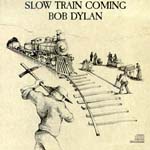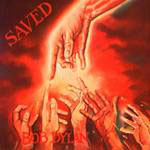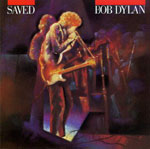OldSpeak
Way Out in the Wilderness: The Spiritual Journey of Bob Dylan
By Jayson Whitehead
December 09, 2002
"In a little hilltop village, they gambled for my clothes.
I bargained for salvation an' they gave me a lethal dose.
I offered up my innocence and got repaid with scorn."
—"Shelter from the Storm""If you want to rock and roll you can go down and rock and roll.
You can go see Kiss and you can rock and roll all the way down to the pit."
—11/26/79, Tempe, AZ"I believe in a God of time and space, but if people ask me about that,
my impulse is to point them back toward the songs.
I believe in Hank Willliams singing ‘I Saw the Light.’ I’ve seen the light, too."
—1997, in Newsweek
 |
When Bob Dylan released Slow Train Coming in 1979, the jaws of his fans and the music world in general collectively dropped. Filled with songs like "Gotta Serve Somebody," "Gonna Change My Way of Thinking," and "When He Returns," the Muscle Shoals recorded album was a gospel drenched, hard laced polemic for the core principles of Christianity. And when Dylan took to the road shortly thereafter, audiences found out how serious the bard was about his new beliefs. A typical show began with a couple of songs—often "Gotta Serve Somebody" and "I Believe in You"—before Dylan would lecture the audience about false prophets, judgment at hand, and the imminent return of the one and only savior Jesus Christ. The show would continue in this fashion, with only new songs, all explicitly Christian in theme, performed.
Longtime followers were outraged. How could the man who proclaimed "don’t follow leaders" and that the answer was "blowin’ in the wind" have found Jesus and now sing "there's only one authority, and that's the authority on high"? "It was more shock and confusion initially," says Scott Marshall, the co-author of Restless Pilgrim: The Spiritual Journey of Bob Dylan.
The knee-jerk reaction was not limited only to fans. Although Dylan won a Grammy for his vocal on "Gotta Serve Somebody," his record company, Columbia, balked at his next release, 1980’s Saved. The album cover depicted a large hand, dripping with blood, reaching from the sky down to a number of smaller hands stretching upwards. Columbia reportedly sent the record to radio stations enclosed in a plain white sleeve and five years later replaced it with a different image.
For those hoping that Dylan’s fanaticism was only a one-shot deal, Saved was proof that his convictions were real. "By His grace I have been touched, by His word I have been healed, by His hand I've been delivered, by His spirit I've been sealed" went the title song and the rest of the album followed suit. While it contained a few of Dylan’s best "gospel" songs—"Solid Rock" and "In the Garden" stand beside any of his best—the album seemed uninspired.
His next album Shot of Love contained songs that were not explicitly Christian—although most were along the lines of "Property of Jesus" and "Every Grain of Sand"—and by Infidels in 1983, with only one song, "Man of Peace," directly religious in content, the rumors began to fly. A New York magazine headline read, "Dylan Ditching Gospel?"
Today, the general opinion is that Dylan flirted with Christianity the same as he did with amphetamines or country music in the ‘60s, abandoning them for whatever his next phase was. But in Restless Pilgrim (Relevant Books), Marshall argues that Dylan has maintained his Christian beliefs. "I think he’s mellowed, but it’s a reasonable conclusion that Dylan has maintained his faith in Jesus, as expressed through his songs," says Marshall. "I don’t think I’m projecting my personal beliefs on Dylan, because I listened to Dylan before I was Christian, and I didn’t even listen to those records, I guess because I thought they were too religious, maybe. And once I had my experience, I was curious as to what happened to Dylan, and when I heard those songs, I was like, ‘Whoa!’ I knew something had happened to him when I heard those songs, they were right to the heart."
Bob Dylan has spent his life defying expectation and confounding explanation. Yet, it seems clear through songs and public statements that he does indeed believe in a Supreme Being. The rest is obviously between him and his Creator. I recently spoke by phone with Scott Marshall about Dylan’s "Christian period" and whether Dylan is still a "believer."
OldSpeak: How did people take it when Dylan first started saying he was "born-again"?
SM: It was more shock and confusion initially, but then some people took some sober reflection. One of the items that’s always mentioned is John Wesley Harding with all its biblical parables, if you will, and that was over a decade before Slow Train. Then, as a Jewish person, Dylan was certainly sympathetic to the person of Jesus. Gospel songs obviously have a pretty major root as far as American music, so I know it was through the songs, too. But you know, just the stuff he wrote, like "Masters of War": "Even Jesus would never forgive what you do." That overstatement, and other things that he wrote when he was in his early twenties, all those songs, there’s definitely a moral component to his lyrics from the very beginning.
Dylan was already into the Rebel Outlaw image. Didn’t Jesus fit into this outlaw category?
During one of Dylan’s infamous stage raps during those gospel tour years during ‘79 and ‘80, I remember him saying once, "I know a lot of y’all out there think y’all are rebels, but let me tell you something, you ain’t no rebel until you rebel against the devil." Coming from the mouth of Bob Dylan, that was definitely part of the shock and confusion people were feeling during that time.
Dylan also spent so much time exploring his Jewish roots.
After his experience with Jesus, he studied with Orthodox Jews; obviously their Bible is the Hebrew Scriptures. I personally think that he immersed himself more in his Jewish roots after his experience with Jesus. For example, there’s this one beautiful quote from ‘83, the very year Dylan studied with the Lubavitchers, who are Orthodox Jews. It’s a wonderful quote he gave about the Old Testament, and he talked about prophets, and he included John the Baptist in that quote. So I just think he had a greater appreciation. It just shows to me, how he had immersed himself in the Bible. This is what he said in ‘83:
"My so-called Jewish roots are in Egypt, they went down there with Joseph, and they came back out with Moses, you know, the guy that killed the Egyptian, married an Ethiopian girl, and brought the law down from the mountain. The same Moses whose staff turned into a serpent. The same person who killed 3,000 Hebrews for getting down, stripping off their clothes and dancing around a golden calf. These are my roots. Jacob had four wives and thirteen children. Who fathered thirteen children. Who fathered an entire people. Those are my roots, too. Gideon with a small army, defeating an army of thousands. Deborah, the prophetess. Esther, the queen. And many Canaanite women. Reuben, slipping into his father’s bed, when his father wasn’t there. These are my roots. Delilah tempting Samson, ‘killing him softly with her song.’ The mighty King David was an outlaw before he was king, you know. He had to hide in caves, and get his meals at back doors. The wonderful King Saul had a warrant out on him—a ‘no-knock’ search warrant. They wanted to cut his head off. John the Baptist could tell you more about it. Roots, man—we’re talking about Jewish roots, you want to know more? Check up on Elijah the prophet, he could make it rain. Isaiah the prophet, even Jeremiah. See if their brethren didn’t want to bust their brains for telling it like it is. Yeah, these are my roots, I suppose."
That’s one of the most fascinating Dylan quotes in the interview canon. The interview was with Martin Keller for the Minneapolis City Pages in the summer of ‘83, when Dylan was recording Infidels. And to me, to include John the Baptist, who Jesus said was the "prophet of prophets," that is no small thing, in that big list he reeled off.
During that early Gospel period, it seems like Dylan would have realized that if he’d played more of his older songs, people would have been less alienated, and his message might even have gotten across better.
In 1980, Dylan was interviewed by Robert Hilburn of the L. A. Times, and he said he didn’t play his older songs back then, because he wasn’t sure if they were anti-God or not. Obviously, for six months, he felt that way. And what’s funny is that Larry Myers, the Vineyard pastor who shared the gospel with Dylan, and later played mandolin in 1986 on Knocked Out Loaded, was quoted as saying he encouraged Dylan to play his older songs because this was obviously Dylan’s gift from God, and all these older songs he wrote, a lot of them had truth and beauty in them, and if truth and beauty are from God, he should feel free to sing them. What’s funny is Dylan disregarded the pastor’s advice.
Again, it’s that newborn thing. Someone recently, a fellow Christian, which I found to be kind of pathetic, said, "I just can’t believe Dylan was so insecure with himself that he thought his songs were anti-God." I just thought that was sad because that wasn’t making allowances for Dylan working things out in his own mind. His world-view had just done a 180, and people have different convictions at different times. To speak that, in the L. A. Times, that he wasn’t sure if they were anti-God or not, I thought that took some courage, just to be vulnerable like that.
It seems crazy that Columbia Records shipped Saved in plain white sleeves, because they had so much aversion to the original cover.
That says something. If you go onto Bobdylan.com, his official website, the original Saved cover is up there. Dylan apparently—this was bizarre, maybe not bizarre, but pretty wild—had some vision, and he said that cover image was exactly how he saw it, and all these songs came to him at once. That’s pretty intense
 |
 |
A lot of his newer songs are steeped in Biblical images. And certainly influenced by a lot of old blues and gospel stuff, too.
Yeah, I think so. If someone was really trying to understand Dylan’s art, and how he expresses things, you really have to be impoverished not to factor in the Bible, because Dylan himself has said it, on a number of occasions, in interviews, how his songs get back to that, those allusions. Even though he’s written less songs since his conversion, as far as his pace of songwriting, when he does write a song, there’s just so many more biblical allusions. There were plenty, even before ‘79, but now it’s even more pronounced, and it’s a pretty vital thread.
After doing this book, have you come away convinced he is still a Christian?
Yeah, I would say that.
Doesn’t Dylan go out of his way to defy that type of categorization?
If you think about it, the question just hasn’t been asked. In ‘79-‘81, he said, "Repent or burn," and in ‘97, he said, "I believe in a God of time and space." You have to read between the lines. But if someone asked him directly, "Do you believe Jesus is God, is the Messiah," I’m certain he does. And historically, that is what the label of Christian has meant, although these days Christian can mean all kinds of different things, I guess, but I would say he’s historically rooted and would be a fellow brother in Jesus.
I kept away from any gossip about Dylan’s personal life because there’s plenty of that out there, and I just think that he’s struggled greatly. If you really look at the biblical heroes, there’s a lot of awful darkness, and I think that although my book doesn’t touch upon gossipy segments, I think enough of Dylan’s lyrics, like, "What good am I?" for example, from Oh Mercy. There’s plenty of his lyrics that I think reflect that Dylan has seen the darkness from within, and also out there in the world. The human condition, as it’s called. There’s no question that, for him, from what he’s said, [the human condition] is sin. As quaint a notion as that is, I think that’s what he’s rooted in, that kind of worldview.
I think he sees himself as a prophet in some sort of apocalyptic sense.
I would have to agree with you. Like in 1984, when he was asked in Rolling Stone, "Do you believe the Old and New Testaments are equally valid?" And he said, "Yes, to me." So I think that the Old and New Testaments, to him, are a unit, but as far as his personality, the way God made him, and the way he’s expressed himself, I would certainly say that he’s in that kind of Old Testament prophet mold.
There’s this song, it’s an old country song he started covering in ‘99, and he’s played it dozens of time in the last few years, called "This World Can’t Stand Long." Musically, when you listen to it, it sounds innocuous enough, but if you really listen to the lyrics—he doesn’t just choose this out of the blue, obviously there’s intent on any artist’s part—it is apocalyptic, and is talking about how this world’s going to be fire next time, there’s just too much sin, and this thing’s going to end at some point. As silly as it might sound to a lot of people, I think Dylan is just squarely in that. It’s a paradox, really because he’s very counter-cultural in many ways, but he’s very traditional and old-fashioned in many ways, too. That’s a definite paradox, and I think that endears a lot of people to him, really.
Why has Dylan largely been rejected, or overlooked by the Evangelical mainstream?
It’s interesting, there’s always, no pun intended, like a remnant. But you’re absolutely right, as far as the mainstream Christian community. For example, I interviewed Mark Lee, of the band Third Day, who covered Dylan’s "Saved" a couple years ago on an album called Offerings. It had a lot of worship songs on it, and they chose to cover "Saved." I think these guys might be in their 20’s and they found the song, and they thought it was such a great representation of new-born zeal. What’s funny is, I asked him when the first time was he’d seen Dylan, and he said in 1998 for the Grammy’s when Soy Bomb, the practical joker, came on stage, and he thought it was part of Dylan’s act. But the point was, artists in the Christian contemporary movement, don’t even realize that the people who influence them are people that Dylan influenced.
But as far as the non-musical community, when people are public celebrities, I think what happens is, as Christians, we can think that they should be living the perfect life, "Oh, they have the chance to reach millions for Jesus." And I think people project expectations on these celebrities who are just human beings, when we don’t even know the full story, because you can only know these public figures from a distance, for the most part.
I think that Dylan’s just not doing what many Christians expect. Like this guy at a book signing in Greenville, South Carolina, which is near Bob Jones University, was bantering with me, "Do you think Dylan has hid his light under a bushel for the last twenty years?" And I told him, "No, I think his faith has been manifested with a different approach, but I think it’s still there." There’s some in the Christian community who would just frown on the fact that Dylan doesn’t have a good enough ratio of the word Jesus in his lyrics. I don’t mean to paint the Christian community with a broad brush. Some people would be like that, and I would have a problem with that. But for whatever reason, I would say he is obscure. At the pulpit, if you talk about, "Bob Dylan, a fellow brother in the Lord," I think some people might raise their eyebrows. The whole thing of being a brother’s keeper, watching someone’s back, or giving them the benefit of the doubt, I think sometimes as Christians, we can be kind of unbiblical in that way.
DISCLAIMER: THE VIEWS AND OPINIONS EXPRESSED IN OLDSPEAK ARE NOT NECESSARILY THOSE OF THE RUTHERFORD INSTITUTE.


